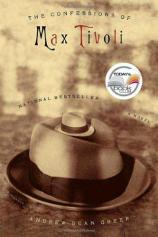Reading Group Guide
Discussion Questions
The Confessions of Max Tivoli: A Novel

1. What did the novel's epigraph and opening sentence mean to you when you began the book, and what do they mean to you now? Are they romantic notions, statements on the hopelessness of love, or perhaps something in between?
2. When you began this book, did you consider growing younger to be only positive? Do you believe that now? Looking at Max's life, what are some of the advantages of true old age?
3. In his focus on Alice, has Max missed the one person who truly loved him his whole life—Hughie? Is it ever easy to recognize such devoted people in our lives?
4. What is society's basis for determining whether a lover is an appropriate age? In what ways does Max's condition actually help illuminate his true character?
5. Max loves Alice as a daughter, as a wife, and as a mother. How does this echo the various roles a lover plays in our lives? Which of Max's roles is he best suited to? Do we always take on recurring roles when it comes to love?
6. Are Max's fears of infancy—the inability to walk independently, care for himself, and articulate his needs—very different from the traditional fears of growing old?
7. Greer frequently allows his narrator to address the reader directly, occasionally in a cheeky tone. How much of the plot surprised you, in spite of the intimate, candid aura created by Max?
8. Max's memory of his first kiss with Alice is nothing like her recollections of that same event. What do you make of the varying perceptions offered in the novel? Is Max a trustworthy narrator?
9. Max's first role in Alice's life is as her "Shabbos goy." Does Max later continue to be the "houseboy of her heart" in some way, an aid in her life?
10. Is Max's reverse aging the only thing standing in the way of his happiness? How much of his outcome is affected by his personality, fate, and other factors?
11. Max's condition gives him unusual opportunities—for instance, having access to his son's life that few fathers have ever had. Does it deepen or erase his role as a parent? Though they both appear to be boys, is there still a generation gap between Max and his son?
12. The word confession carries connotations of wrongdoing or scandal on the part of the speaker. To what is Max Tivoli confessing in his "memoir"? Is first-person narration crucial to this plot?
13. Greer embeds countless historical details in the novel, such as the use of collars for mailing notes after the earthquake and the seated poses struck by women accustomed to wearing bustles. What does the novel teach us about the quirks of daily life a century ago?
14. Alice is not a typical Victorian woman. She is hotheaded and freethinking; what do you think of her as a match for Max? Is she merely self-centered and flaky, or do you agree with Victor Ramsey's theory that she changed her life through the only means available to women during that time period: marriage? What is Alice's ultimate reason for leaving Max?
15. Max struggles to make his outward appearance both socially acceptable and less at odds with his psyche. Describe what your external appearance would look like if it were a picture-perfect representation of your psyche.
16. How did you feel when you read of Hughie's death? Why do you think he killed himself? Did the modern idea of a "gay man" exist back then? Given that at the time even openly gay Oscar Wilde had a wife and children (as Hughie did), what options did gay men and women have for happiness or love?
17. What would you have done with a life like Max's? Is he an idealist, an artist in a world not made for him, or a brute who squandered a potentially happy life? What are the sources of a truly happy life? In what ways have you "grown younger" in your own life?
The Confessions of Max Tivoli: A Novel
- Publication Date: February 1, 2004
- Hardcover: 288 pages
- Publisher: Farrar, Straus and Giroux
- ISBN-10: 0374128715
- ISBN-13: 9780374128715








